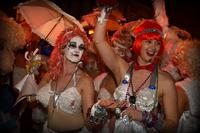Did you have a good Mardi Gras? I did. The bad weather held off. My family and friends had a blast at our house, midway between St. Charles and the Mardi Gras Indians. Passersby were dancing on the sidewalk and street in front of our house; we had music all day and we got people dancing!
One of the main reasons we all live here is that New Orleans is a liberal, free-wheelin’, laissez-faire kind of place. Live and let live. Tolerance is part of our city’s culture.
It’s also the reason why people love to visit the city because in New Orleans, they feel like anything goes, and it pretty much does, most of the time. Let’s face it: New Orleans prides itself on being a place where there’s always a party, and creative party, at that. I still won’t ever be convinced to call New Orleans the “Big Easy” because it implies that life here is easy. It’s not exactly easy, but it’s a lot richer, more laid-back and more enjoyable than living anywhere else I can think of. Its cultural and culinary riches are unparalleled.
When they call New Orleans the northernmost Caribbean city, that’s a more apt description. We take things a lot slower here. It takes a long time to get something done that would be finished in a quarter of the time it takes in other cities. Unless it comes down to putting together a new celebration. That happens a lot quicker than getting roadwork done, or building a school.
Therein, I believe, lies the rub.
The city has been touting itself for quite a while now as the new hub for young entrepreneurs. The Times-Picayune even published a story describing entrepreneurial Mardi Gras ideas. Okay, then, brand-new ways to throw a party!
That I can understand: apply your entrepreneurial skills to throw a party for your friends to become “members” of or create a new spectacle for onlookers to applaud. If that’s not New Orleans entrepreneurship, I don’t know what is.
It would be wonderful if we could channel those entrepreneurial leanings towards solving some of the problems this city has.
I’ve noticed this about New Orleans: the Mardi Gras mentality of private clubs (AKA krewes) permeates the culture here. From Mardi Gras private clubs (Rex, Muses, Zulu, you-name-it krewes), to Social Aid and Pleasure Clubs, to Mardi Gras Indian gangs, to dance groups (610 Stompers), first you have to belong to a group. If you don’t, you’re on the outside looking in, somehow wishing you were on the inside.
And, of course, if you want to be on the inside, you have to pay a price to do it, whether it’s by playing by a group’s rules, or paying their fee, being a certain skin color, making a certain amount of money, belonging to a certain social class, or simply being buddies with the right gatekeeper.
It’s almost an antithetical mentality for a city that supposedly prides itself on individuality and its tolerance of people who are somehow different from the norm. Or maybe it’s just a successful façade that New Orleans has cultivated over the past couple hundred years in order to continue what we seem to do best: throw a great party.
A lot of time, effort and money goes into our ongoing party, and it’s sure great for tourism. Now, I’m glad that the parties exist, but it seems to me that it would be so much better for the city as a whole to encourage, nay, require these groups to put as much time and money back into solving city problems as they do to make the party happen.
I think it’s time that we re-think Mardi Gras as a means to help rebuild and improve our overall quality of life year-round. Require krewes, no matter how large or small, to pay a surcharge commensurate with the number of members or dues paid or some other criteria, that would be put into an education fund, or street rebuilding, or schools, or helping the homeless. The partyers need to give something back to the community in addition to just throwing a party for the masses (and of course, entertaining themselves). Give a public party = give something back. How can anyone be against that?





